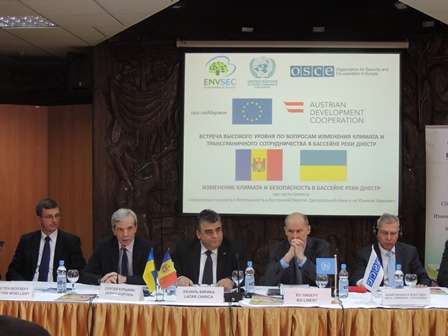
Serhiy Kurykin, Deputy Minister of Ecology and Natural Resources of Ukraine, and Lazar Chirica, Deputy Minister of Environment of the Republic of Moldova, met today in Kyiv to launch the Strategic Framework for Adaptation to Climate Change for the Dniester Basin.
The Strategic Framework will support the two countries in their joint action to manage climate change risks at the basin level and to enhance transboundary cooperation in general.
Mr. Chirca stressed that the successful implementation of the Strategic Framework “will help to reduce negative climate change impacts, and will facilitate sustainable development in the Dniester River Basin”. Mr. Kurykin noted that the implementation of the Strategic Framework for Adaptation “will help Ukraine to fulfil its obligations under various international agreements, and will strengthen overall cross-border cooperation between the Republic of Moldova and Ukraine”.
The Deputy Ministers also emphasized the importance of the entry into force of the bilateral Dniester Treaty, which was signed by the Ukrainian and Moldovan Ministers of Environment in Rome in November 2012.
The launch took place during the High-Level Event on Climate Change and Transboundary Cooperation, organized by the United Nations Economic Commission for Europe (UNECE) and the Organization for Security and Cooperation in Europe (OSCE), which brought together governmental and non-governmental stakeholders, including representatives of the Moldovan and Ukrainian water agencies, as well as representatives of regional and international organizations along with bilateral donors.
The High-Level Event took place in conjunction with the Tenth Meeting of the Working Group on Flood Management and Climate Change Adaptation, held on 22 and 23 April 2015 to discuss the progress in project implementation.
Both events were held in the framework of the Dniester component of the project “Climate change and Security in Eastern Europe, Central Asia and the Southern Caucasus”, jointly implemented by UNECE and OSCE under the Environment and Security Initiative (ENVSEC) and with funding from the European Union and the Austrian Development Cooperation. The project is also part of the programme of pilot projects on climate change adaptation in transboundary basins under the UNECE Convention on the Protection and Use of Transboundary Watercourses and International Lakes (Water Convention).
Note to Editors:
The Strategic Framework was developed with support of UNECE and OSCE together with a broad range of governmental and non-governmental stakeholders in both countries, including the Ministry of Ecology and Natural Resources of Ukraine, the Ministry of Environment of the Republic of Moldova, the national hydrometeorological services, the National Water Resources Agency of Ukraine, Apele Moldovei and others. Following the endorsement of the Strategic Framework, an Implementation Plan will be developed and submitted for adoption by the countries. The Framework has been developed in a participatory manner and is based on a thorough assessment of climate trends and their possible impacts in the Dniester Basin, in particular with respect to growing risks of extreme floods, reduced availability of water, deteriorating water quality and endangered natural ecosystem.
Flooding is already a major transboundary problem for the Dniester and heavy floods, such as the one in 2008, led to casualties and major financial losses. In addition, every two to three years over the past decade the lower Dniester has been significantly affected by drought with increasing, sometimes catastrophic losses. The combination of flooding and drought can be attributed to extremely uneven rainfall during the year. It is expected that climate change will lead to drier summers with less flow, but also more frequent and heavier rains in the basin, resulting in increased frequency and intensity of floods and droughts. Such impacts pose a potential risk to the security of the 7 million people living in the river basin and the more than 3 million people outside the river basin who rely on the water from the Dniester.
Other adaptation measures implemented or initiated in 2014, include:
- A preliminary Dniester reservoir model, which was developed jointly with the Alliance for Global Water Adaptation (AGWA) and discussed with relevant stakeholders at two modelling workshops in October 2014 in the Republic of Moldova and Ukraine. The modelling results help the stakeholders from relevant sectors (hydropower, water supply (including agriculture), flood mitigation and conservation) to ensure integrated management of the reservoirs for real-time operations and planning purposes.
- Data was collected and processed and preliminary calculations for the water balance were conducted at the basin level.
- Work on a joint information platform for data exchange between the relevant basin authorities and the development of a model on flow forecasting to the Dniester reservoirs was initiated.
- Field work, including an assessment of relevant information for the development of the feasibility study for improving water exchange between the main branch of the Dniester and the flood-plains at Mayki-Palanca in the lower Dniester, was finalized.
- Two annual basin-wide youth art contests “Colors of the Dniester: save the climate by conserving river-bank ecosystems” were supported in 2013 and 2014, which resulted in brochures illustrating about 70 works of the winners and several awarding ceremonies. More than 400 children and students participated in the contest each year.
- A training for children and youth “Change Yourself, not the Climate” was organized within the large-scale campaign “One Million Trees for the Dniester” in Ukraine. A total of 160 children from rural areas of Odessa oblast (villages of Frunzivka, Zatyshia and Novoselivka) and around 50 students from Odessa State Environmental University participated in the event on the Kuchurgan River, a tributary of the Dniester.

